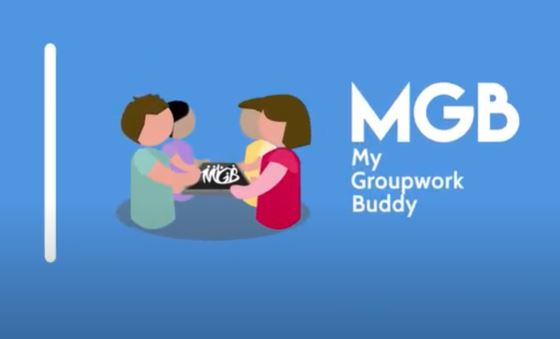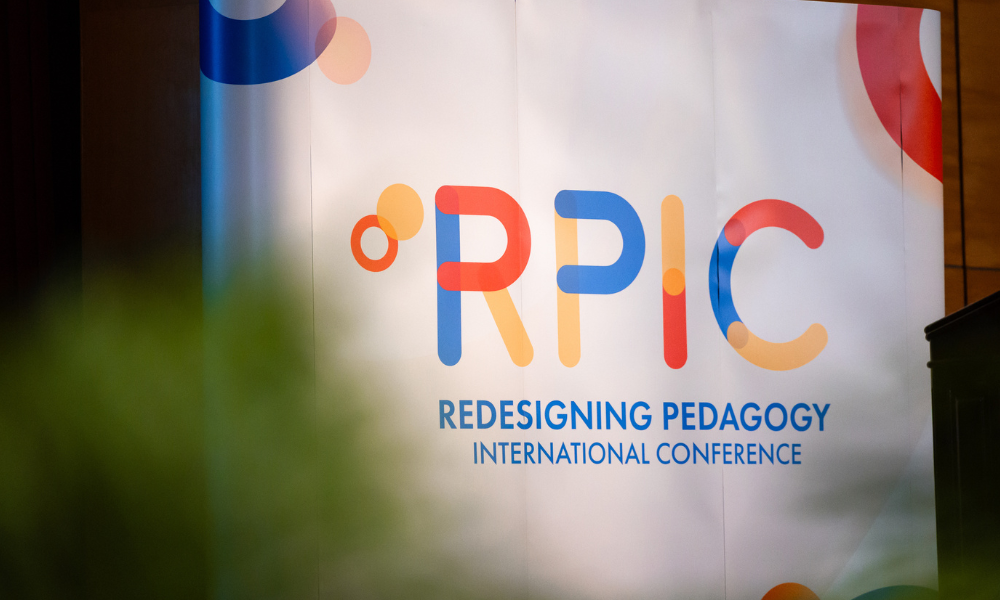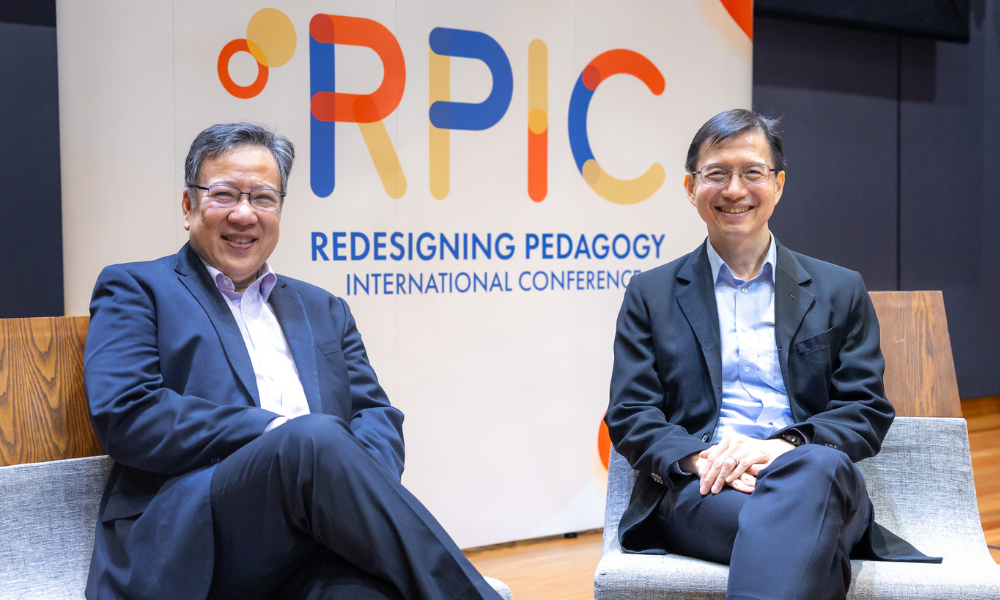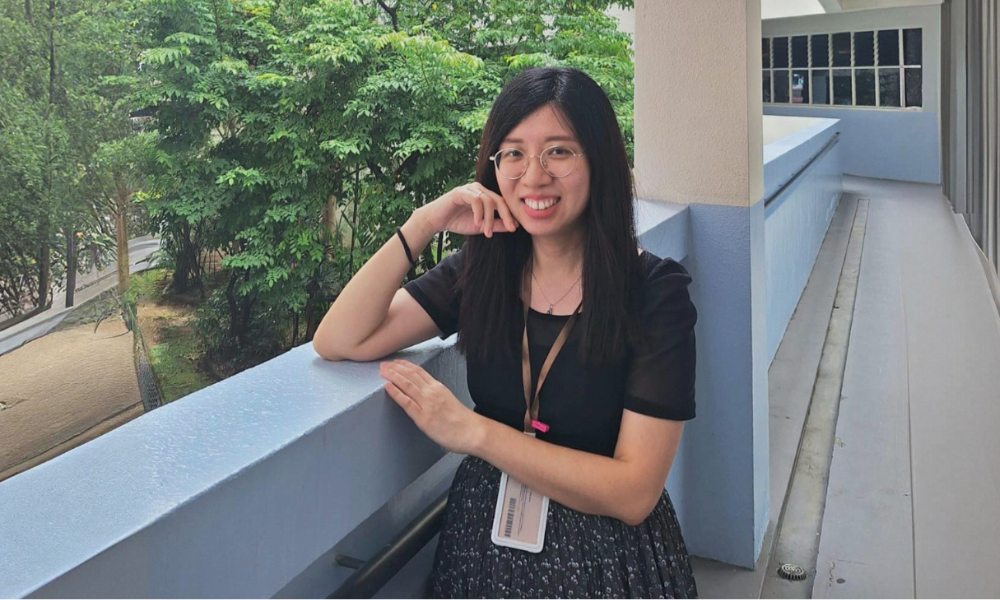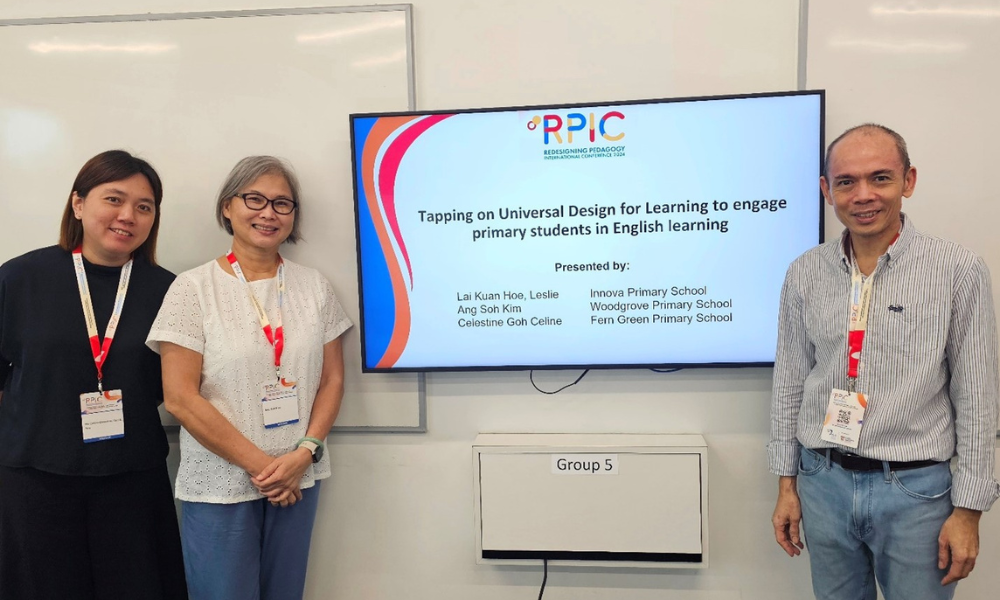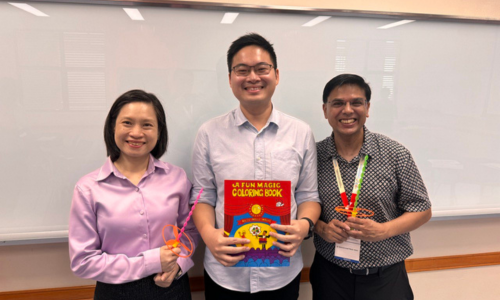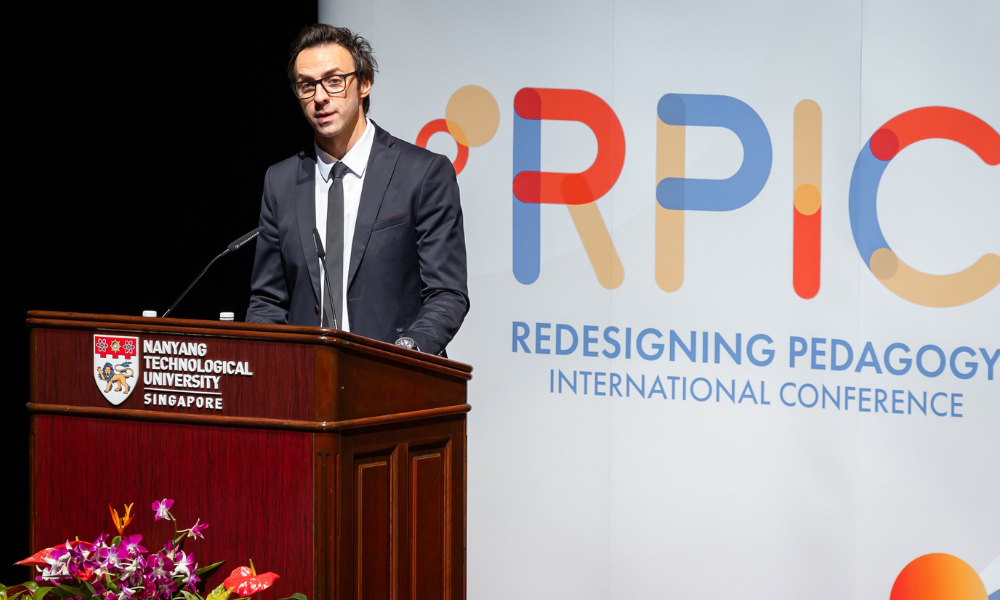My Groupwork Buddy (MGB)
MGB for Nurturing Teamwork Competencies in Learners
- Key Benefits & Features
-
MGB is an intervention stemming from a formative learning analytics pedagogy, focusing on four teamwork dimensions and housed on a web-based software.
-
It can help to sensitize students to their personal teamwork competencies, becoming more purposeful in learning the competencies in team settings.
-
It helps teachers to better understand their students’ teamwork behaviours, allowing teachers to Systematically nurture these behaviours in students.
-
It equips teachers with tools (i.e., MGB platform) to scaffold the teaching and learning of teamwork competencies.
-
 Why MGB?
Why MGB?
MGB enables teachers to nurture their students’ teamwork competencies. Ready-to-go and easy-to-use, MGB is versatile and can be used in any subject that includes a two to six month collaborative inquiry task.
What is MGB?
MGB is a digital formative assessment approach and software to nurturing teamwork competencies. It focuses on four teamwork dimensions and is co-designed by researchers, educators, web developers and policy makers. The pedagogical approach is Team and Self Diagnostic Learning (TSDL) which utilizes learning analytics in a formative manner and is aligned with the Singapore Teaching Practice.
What are the Features in MGB Software?
- Lesson content pages
- Synchronous student team chat
- Self and peer teamwork competency ratings
- Personal and team micro-profile visualizations (student dashboard)
- Personal and team reflections
- Steps-setting
- Status checks of teamwork steps
-
Teacher dashboard
 How Does MGB Work?
How Does MGB Work?
What’s the Team and Self Diagnostic Learning (TSDL) Framework?
Undergirding MGB is the TSDL framework – a pedagogical approach that uses formative learning analytics to nurture students’ teamwork competencies.
Four Stages of the TSDL model
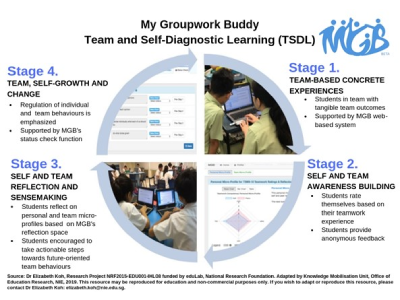
Stage 1: Team-Based Concrete Experiences
To activate teamwork behaviours, students are situated in a team setting with tangible team outcomes. Collaborative learning is supported by MGB web-based software:
- Lesson pages where teachers provide resources for the team task
-
MGB chat – a platform for students’ online discussion
Stage 2: Self and Team Awareness Building
Through the rating function on MGB, students rate themselves and team members and provide peer comments anonymously based on their recent teamwork experiences.
The student dashboard displays students’ peer comments as well as aggregates ratings into Personal and Team Micro-Profiles on four teamwork dimensions to raise students’ awareness of their personal and team’s teamwork competencies.
The four teamwork competency dimensions are
- Coordination – organizing team activities to complete a task on time
- Mutual Performance Monitoring – checking and tracking the performance of team members
- Constructive Conflict – dealing with differences in interpretation between team members through discussion and clarification
-
Team Emotional Support – supporting team members emotionally and psychologically
Stage 3: Self and Team Reflection and Sense Making
Guided by MGB’s reflection space, students reflect on the information acquired from their personal and team micro-profiles, first individually and then as a team. Students are then encouraged to take actionable steps to improve on future-oriented team behaviors.
Stage 4: Team and Self-Growth and Change
In this stage, students are encouraged to continue their team-based project work through MGB where a Teamwork Steps Status Check function is provided to help students monitor their progress on the steps they have set individually and as a team. This emphasizes the regulation of the individual and the team on their behaviors, which are key mechanisms for changing attitudes and actions.
 Evidence from MGB research
Evidence from MGB research
How did students respond?
- Students’ peer-rated teamwork competency dimensions increased over the course of the intervention.
- Many students reflected that MGB was effective in helping them learn more about and improve their personal teamwork competencies. This is as the peer feedback visualization for reflection led to better introspective processes for learning about their own personal teamwork competencies.
-
Students also commented that as they monitored their progress on goals over time, they find themselves to be more metacognitively aware of their teamwork tendencies in terms of understanding their current perceptions and/or intentions for improvement.
In addition, Teachers who Participated in the Research Noted:
- MGB can support teachers’ professional competencies in teaching and facilitating group activities in terms of:
-
Design and delivery of group-based collaborative inquiry tasks
-
Tracking of student progress and their teamwork competencies for any necessary follow-up actions
-
- Teachers stated that MGB is effective in helping both teachers and students:
-
Develop a better understanding of the concept of teamwork and the competencies dimensions involved when working in a team
-
Heightening teachers’ insights and understanding of their students
-
Understanding team dynamics of how and why students behave in certain ways
-
Teachers also shared that their role and involvement in research has expanded as a teacher, facilitator, co-designer of learning experiences and environments and practitioner researcher through this project.
Overall, there is a general sense of fulfilment and achievement as teachers grow in their professional competencies to facilitate and teach teamwork competencies. As teachers see meaning in teaching teamwork competencies in their classes, they are convinced of its place in the education of their students.
 How Can Teachers Get Started?
How Can Teachers Get Started?
The MGB software can be used in schools with support from their internal IT to deploy the system on their school web server. The school can contact the PI for more information.
MGB lesson package is also available for teachers as a downloadable pdf with accompanying slides. Alternative technologies are also provided in the lesson package if the school does not use the MGB software.
 Related Links
Related Links
- Developing students’ ability to work together using teamwork competency profiles (Kom, M. S. (2018). Developing students’ ability to work together using teamwork competency profiles. i in Practice (pp. 18 – 26). Educational Technology Division, Ministry of Education, Singapore.)
- Knowledge Resource Bank article in 2022 on “My Group Work Buddy for Geography (MGBGeo)” (updated as of 9 May 2022)
 Further Readings
Further Readings
-
Koh, E., Hong, H., & Tan, J.P-L. (2018). Formatively assessing teamwork in technology-enabled twenty-first century classrooms: exploratory findings of a teamwork awareness programme in Singapore. Asia Pacific Journal of Education, 38(1), 129-144.
-
Koh, E., Tan, J. P-L., Hong, H., &. Tee, Y-H. (2018). Growing teamwork competency: A mixed methods study of an iterative digital formative assessment approach. In 13th International Conference of the Learning Sciences (pp. 1461-1462). London, United Kingdom: International Society of the Learning Sciences.
-
Advani, V. K., Koh, E., Tee, Y. H., Suresh, D., & Tan, J. P-L. (2018). Enhancing a techno-pedagogical tool for student teamwork growth. In Proceedings of the 26th International Conference on Computers in Education (pp. 181-186). Manila, Philippines: Asia-Pacific Society for Computers in Education.
-
Tee, Y. H. & Koh, E. (2018). A Digital Formative Assessment of Teamwork in Collaborative Inquiry Student Teams. In Proceedings of the 26th International Conference on Computers in Education (pp. 7-10). Manila, Philippines: Asia-Pacific Society for Computers in Education.
-
Koh, E., Tan, J.P-L., Hong, H., Suresh, D., &, Tee., Y-H. (under review). Infusing the teamwork innovation My Groupwork Buddy in schools: Enablers and Impediments.
 Research Projects
Research Projects
The following projects are associated with MGB research :
- Developing My Groupwork Buddy for Geography (newly completed project – updated on 13 September 2021)
- Integrating My Groupwork Buddy into the classroom to enhance student team collaboration and teacher pedagogical practice
- Measuring and Nurturing Teamwork Competency through a Computer-supported Creative Collaborative Problem-Solving Program
- Exploring Teamwork Beliefs and Competencies in Technology-enabled 21st Century Classrooms
 Research Team
Research Team
For enquiries on MGB, please contact the Principal Investigator Dr Elizabeth Koh at elizabeth.koh@nie.edu.sg.
Principal Investigator
-
Dr Elizabeth KOH, Office of Education Research (OER), NIE
Co-Principal Investigators
- Dr Jennifer TAN Pei-Ling (formerly of NIE)
-
Ms Helen HONG, CRO, MOE
Collaborators
- Mr KOM Mun Siong, MOE, ETD
- Mr Patrick SHIU, MOE, ETD
- Mr TAY Kian Leng Patrick, Anglican High School
- Mdm Sarifah TAMSIR, Pasir Ris Secondary School
- Mrs Serene LUO, Pasir Ris Secondary School
- Ms Rebecca NEO, formerly of Pasir Ris Secondary School
 Acknowledgments
Acknowledgments
This research on MGB was funded by National Research Foundation (NRF), Singapore under the eduLab Programme (NRF2015-EDU001-IHL08) and administered by National Institute of Education (NIE), Nanyang Technological University, Singapore. Any opinions, findings, and conclusions or recommendations expressed in this material are those of the author(s) and do not necessarily reflect the views of the Singapore NRF and NIE.
This knowledge resource was written by Ms Lyndia Teow and Ms Tan Giam Hwee and edited by Ms Tee Yi Huan and Dr Elizabeth Koh in 2020; updated by Ms Monica Lim on 30 December 2021.

